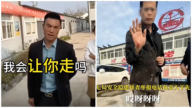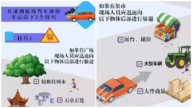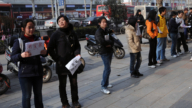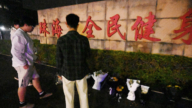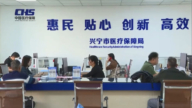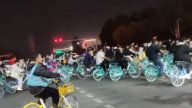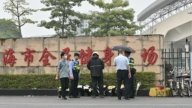【新唐人2013年12月26日訊】流亡美國的著名中國異議人士魏京生,最近在評論文章中指出,從2010年中共開始實施「保安服務管理條例」、正式承認「保鏢」的合法地位以來,三年中,保鏢業迅速成長,現在已經有430多萬保鏢。魏京生認為,保鏢業迅速崛起,表明社會正處於崩潰的邊緣、動盪的前夜。請看下面報導 。
魏京生12月24號在《自由亞洲電臺》的特約評論中,引用大陸媒體《經濟觀察報》的資料指出,中國大陸現在有4000多家安保公司,保鏢430多萬。根據安保公司的說法,他們的客戶最初是一些社會名人,後來就發展到整個富裕階層,所以業務十分繁忙。有些公司的年收入上億,正在考慮成為上市公司。
魏京生指出,美國即使比中國富裕得多,名人也多得多,但保鏢業也沒有幾百萬人從業;也沒有幾百億的利潤。
他認為,西方社會分配比較平均,並且在二戰之後,各國都實行了程度不等的社會福利措施,和收入公平的原則,貧富差距維持適當,不會產生像中國現在這樣嚴重的仇富心理;也不會產生像現在中國這麼多的搶劫和綁架。
34歲的陸先生是一位億萬富翁,不久前他的好友遭綁架勒索後被殺害。出於保護人身安全的考慮,他簽約20多位職業保鏢,給自己和家人都配備了貼身保鏢。這些保鏢還要負責公關、商務、看護家庭、接送小孩等。
旅美獨立評論員張健認為,其他國家都有貧富差距問題,但都沒有像中國如此之大﹔其他任何發展中國家也都有仇富問題,也沒有像中國如此仇富﹔而每個國家都有社會不公問題,也都沒有像中國如此不公。
旅美中國社會問題研究人士張健:「保鏢業的產生,其實從另一個角度,折射了中國當代現今社會,就是:中國的富人已經成了人們的罪敵,還已經變成了盤剝人民的份子。」
張健表示,人民在絕望的情況下,就會鋌而走險。
其實,在中國頻頻發生富豪被綁架案。
浙江溫州「新雅集團」的董事長鄭步良,是億萬富豪,1998年,他的兒子被綁架並且被撕票殺死;2005年,內蒙古知名民營企業家雲全民,9月25號遭綁架,第二天他的家人交付240萬元贖金後,綁匪依然殘忍的將他撕票;2011年浙江億萬富豪金某,被7名劫匪綁架勒索3500萬;今年(2013年)9月,中國首富「娃娃哈」公司董事長宗慶後被人砍傷;11月,遼寧本溪女富豪被綁架勒索300萬。
僅2004年,公安部公布的當年綁架案件數為3863起,遠遠超出世界其他國家。
魏京生的文章還指出,西方社會是用法制來保障社會公平,公正的處理社會糾紛,避免弱肉強食和不公平引起的糾紛擴大。但在中國卻恰恰相反,在憲法裡規定了「政黨大於法律」。在現實中也是當權者的意志大於法律﹔特權階級的權利大於法律;執法者可以隨意解釋法律。統治者取消了憲法和法律本身的權威,也就是取消了自己的合法性,僅僅依靠暴力執法維持。
魏京生認為,中國老百姓有遵紀守法的傳統,但是經過中共幾十年的現身說法式的教育,法律越來越沒有權威,越來越多的人用非法的手段解決致富和報仇問題,政府也需要僱用幾百萬軍警保護﹔官僚和富人還需要僱用保鏢來保護。
作家廖祖笙撰文認為,連年幾千億的「維穩」說得嚴重些,就是國家在長期買兇殺人、整人和搶人……。
北京社會活動家、維權人士胡佳:「尤其政法系統的官員,他們欠的血債太多了,都是那種不公正的血債。是由欺壓百姓、甚至剝奪別人自由甚至生命換來的。」
魏京生在文章最後還指出,當社會上層把人民當做待宰的羔羊對待的時候;他們自己也就成為了待宰的羔羊,這樣的社會處於崩潰的邊緣。特別是在有著造反和革命傳統的中國社會,這就是社會動盪的前夜。
採訪/朱智善 編輯/宋風 後製/孫寧
Social upheaval: The bodyguard business is booming in China
Wei Jingsheng, the famous Chinese dissident in exile, states in
his recent article that since the Security Service Management
Regulations went effective in 2010,
bodyguarding has been recognized as a profession by the
Communist regime. Within just three years, there are now more
than 4.3 million bodyguards in China.
Wei Jinsheng believes that the rise of the bodyguard business
signals that society is on the verge of collapse and the eve of
turbulence.
The following is our report.
Wei Jingsheng writes in a column for Radio Free Asia on
Dec. 24 that according to the Economic Observer’s data,
there are more than 4,000 security companies, and 4.3 million
personal security guards in China.
According to the privately-owned security companies,
clients have expanded from celebrities to the wealth class.
The prosperity of business has urged some of them considering
to become listed companies.
Wei Jingsheng indicates that even though the wealthy and the
celebrities in the U.S. are far more numerous than that in China,
the bodyguard business has not flourished into an industry
worth tens of billions of profits in the U.S.
He believes that Western society is healthier in social fairness.
After WWII, disparity is relatively adequate because of
social welfare and policies leading to income distribution.
Whereas China has not done so and thus a serious psychological
resentment of the rich has developed, and consequently
many robberies and kidnappings happen in China today.
Mr. Lu is a 34 – year-old billionaire, his friend was just recently
killed after a ransom.
For personal safety, he signed a contract with more than 20
professional bodyguards for his families and himself.
The bodyguards will take care of public relations, business,
house hold chores, and the kids to-and-from schools.
Commentator Zhang Jian believes that no other country would
have as big a wealth disparity as in China.
There are also resentments against the rich in other developing
countries, but not as severe as in China.
Social injustice exists everywhere, but none as wide and deep
as in China today.
Zhang Jian, commentator: “The bodyguard business reflects
the contemporary Chinese society, where the rich have become
the criminal and the enemy for their exploitation of the people."
Zhang Jian believes that people will risk their lives under
desperate situations.
In fact, ransoms demands happen in China frequently.
Zhejiang billionaire Zheng Buliang’s son was kidnapped and
killed in 1998;
Inner Mongolia entrepreneur Yun Quanmin was kidnapped on
Sept. 25, after his family delivered 2.4 million yuan ransom
the next day, he was still killed;
Zhejiang billionaire surnamed Jin was kidnapped by seven
robbers for 35 million yuan;
Hangzhou Wahaha Group CEO Zong Qinghou was attacked
in September;
A Liaoning female entrepreneur was kidnapped for three
million yuan.
In 2004 alone, there are 3,863 cases of ransom according to the
Ministry of Public Security, far beyond what the rest of the
world have encountered.
Wei Jingsheng’s article also indicates that the legal system in the
West safeguards social fairness and justice and helps to restrict
disputes from worsening.
In China, however, the Constitution regulates
“the party is greater than the law."
In reality, the authorities are above the law, the privileged class
is also above the law, and law enforcers interpret the law
arbitrarily.
However, when the rulers abolish the authority of the
Constitution and the law, they also abolish its own legitimacy,
and thus rely on violence to maintain law enforcement.
Wei Jingsheng explains that the Chinese are traditionally
law-abiding.
Through decades of the Communist ruling and education,
law no longer holds its status in people.
More and more people take the illegal approach to get rich and
revenge,
consequently, the government relies on millions of
military and police to maintain the regime, and the bureaucrats
and the rich rely on bodyguards for personal security.
Writer Liao Zusheng believes that hundreds of billions of state
funds used in maintaining stability is merely a long-term contract
for killing, torture and robbery of the country.
Hu Jia, Beijing activist: “The officials of the political and
legal system, in particular, owe too much blood debt
for injustice, suppression, deprivation of people’s
freedom and even lives."
Wei Jingsheng stresses in his article that when the upper social
strata treat the people as a lamb to be slaughtered, they become
the lambs themselves in a society on the brink of collapse.
In Chinese society with a history of rebellion and revolution,
it is the eve of social unrest.
Interview/ZhuZhishan Edit/SongFeng Post-Production/SunNing


